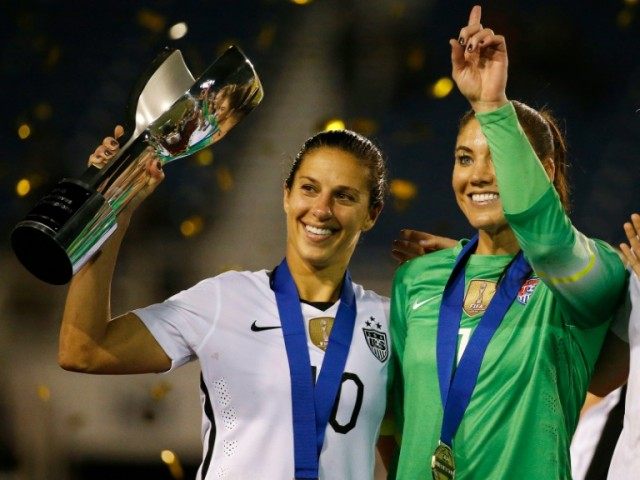The U.S. Senate passed a resolution without objection supporting equal pay for the men and women’s national soccer teams.
The resolution, sponsored by Washington Democrat Patty Murray, cites Title IX, a study showing women making 59 cents for every dollar earned by men in 1963, the high ratings the women’s soccer team enjoyed en route to a 2015 World Cup victory, and a mishmash of other factoids, laws, and platitudes in advancing the measure’s argument.
The resolution “urges the United States Soccer Federation to immediately end gender pay inequity and to treat all athletes with the respect and dignity those athletes deserve,” “supports an end to pay discrimination based on gender and the strengthening of equal pay protections,” and “instructs the Secretary of the Senate to submit a copy of this resolution to the United States Soccer Federation.”
Players Carli Lloyd, Becky Sauerbrunn, Alex Morgan, Megan Rapinoe, and Hope Solo filed a complaint in March against U.S. Soccer with the Equal Employment Opportunity Commission demanding the same pay as the men. They say they make 25 percent less as it stands.
The women shattered the U.S. television ratings record for soccer in their 5-2 victory over Japan in last year’s Women’s World Cup finals. Whereas the men succeeded in winning a single contest in Brazil, the women did not lose a single match in Canada.
U.S. Soccer points out that the American men play in more matches, which include out-of-competition friendlies, the American men generate “significantly higher” revenue than their female counterparts, the women make more than their peers abroad, and the ladies agreed to the pay structure they now decry.
Despite reducing tickets to as little as $5, FIFA drew an average of 26,029 fans for games at the Women’s World Cup in Canada last year. In Brazil in 2014, the men’s attendance average more than doubled that for the women and the males competed in a dozen more matches. Global television ratings and advertising revenue remains exponentially higher for the men as well.
The resolution, which omits mention of reasons outside of sexism that account for the disparity, charges that “unequal pay on the basis of gender tells women and girls that, whether on the soccer field or in the office, the hard work of the women or girls is not valued equally to that of male counterparts.”

COMMENTS
Please let us know if you're having issues with commenting.